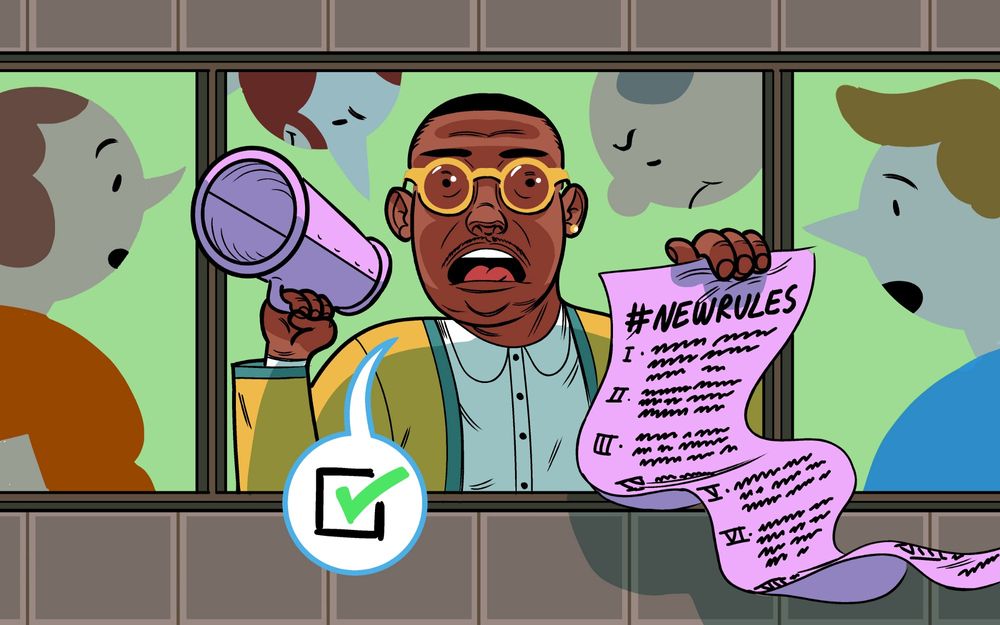Like many of us, I initially expected the shift to mass remote work to be a short-lived adjustment — four to six weeks of working from home, just enough time to make an office return feel refreshing. Now, almost eight months later, it’s hard to imagine ever going back.
The thought of commuting to work again hadn’t even crossed my mind until my company’s leadership sent an email to the staff announcing that they were working on the decision of when to reopen the office in 2021. The planning seems premature, if you ask me, especially with Covid-19 cases spiking all over again (and this time pretty much everywhere). The suits are thinking two or three quarters ahead, which I get; I just hope they’re thinking realistically about the future of office life because some serious shit gotta change if they hope to see me IRL.
I used to love a catered lunch — one of the great perks of modern corporate culture. Now, the last thing I want to do is participate in a free-for-all for chicken satay.
As these conversations continue, my only hope is leadership reaches out to employees to ask for our input. If they do, I’ll be ready. Here are my proposals.
1. Bring back the cubicle
The open office is dead. I want my desk to look like a photo booth — might as well put an airbrushed curtain behind me, too. The insistence that boundaryless workspaces foster collaboration has officially been debunked: If anything, my team has been more effective since going into lockdown. We’ve found ways to brainstorm and innovate by connecting virtually, so it’s not like cubicles will be an impediment when we’re finally back in them. (If they interfere with anything, it’ll be the spread of germs, and I think we can all agree that’s a plus right now.)
2. Regular cleanings of communal spaces
I still don’t trust my supposedly grown-ass coworkers to clean up after themselves. The passive-aggressive notes in the kitchen never seemed to work, and I doubt a pandemic has suddenly instilled home training in these savages. So instead, we need a professional cleaner on hand — a homie in a hazmat suit wiping down kitchen and bathroom surfaces every 15 minutes.
3. Make empathy a practice and company core value
This year has been historically hellish for a variety of reasons, but a silver lining is that many of my colleagues and members of upper management have learned to lead with empathy in regard to communication and expectations. You truly don’t know what folks are going through, and keeping that in mind will be just as important once we’re all back sharing a physical space. Let’s continue being aware and conscientious in the work environment.
4. R.I.P. to catered lunches
I used to love a catered lunch — one of the great perks of modern corporate culture. Now, the last thing I want to do is participate in a free-for-all for chicken satay. Just give folks a Seamless stipend and let them order whatever they hell they want. And no judgment for those who want to eat a solitary lunch at their desks. Not everybody is going to be up for social lunches — and I’m definitely “not everybody.”
5. Masks on at all times
This should go without saying. As if a highly contagious virus isn’t incentive enough, how about weekly prizes for the most stylish facemask?
6. Abolish the conference room
We used to sarcastically remark things like, “This meeting could have been an email.” Let’s actually follow through on that thinking. Here’s to more digital brainstorming or whiteboarding followed by virtual calls to discuss and refine ideas. My iPhone has all the facetime I need.
7. Death to the desk driveby
Now that we’ve been WFH for the past seven months, I think we can all agree that we don’t need to waste people’s time by stopping by their desk for unnecessary chatter. I don’t care if you have your mask on — ping me, email me, text me, yell my name from your desk. I’ll (eventually) get back to you. But yeah, don’t come within six feet of my desk, bro. (That means you, Xander.)
8. Make working in-office optional
The jig is up. These months of quarantine have confirmed what many of us have long known — the office really isn’t necessary. Make alternating schedules to limit the people in the office on a given day. For those who want to continue working from home, let them do so. If we’re being real, some of us have never been more productive.
